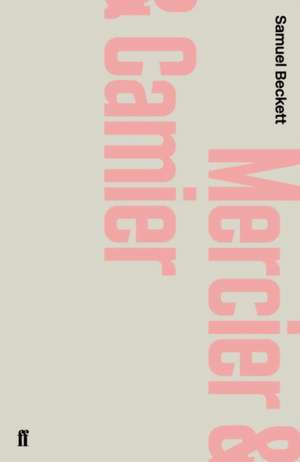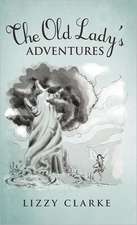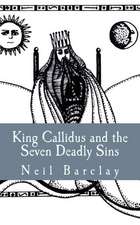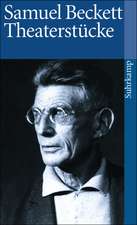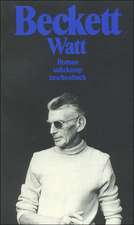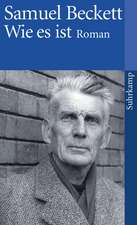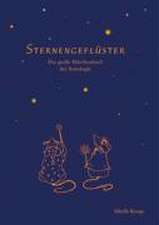Mercier and Camier
Autor Samuel Becketten Limba Engleză Paperback – 3 iun 2010
| Toate formatele și edițiile | Preț | Express |
|---|---|---|
| Paperback (2) | 63.23 lei 3-5 săpt. | +8.12 lei 6-12 zile |
| FABER & FABER – 3 iun 2010 | 63.23 lei 3-5 săpt. | +8.12 lei 6-12 zile |
| Grove Atlantic – 31 dec 2010 | 90.34 lei 3-5 săpt. |
Preț: 63.23 lei
Nou
Puncte Express: 95
Preț estimativ în valută:
12.10€ • 12.94$ • 10.09£
12.10€ • 12.94$ • 10.09£
Carte disponibilă
Livrare economică 28 martie-11 aprilie
Livrare express 13-19 martie pentru 18.11 lei
Preluare comenzi: 021 569.72.76
Specificații
ISBN-13: 9780571244751
ISBN-10: 0571244750
Pagini: 128
Dimensiuni: 129 x 199 x 17 mm
Greutate: 0.2 kg
Ediția:Main
Editura: FABER & FABER
Locul publicării:United Kingdom
ISBN-10: 0571244750
Pagini: 128
Dimensiuni: 129 x 199 x 17 mm
Greutate: 0.2 kg
Ediția:Main
Editura: FABER & FABER
Locul publicării:United Kingdom
Notă biografică
Samuel Beckett:
Samuel Beckett (1906-1989), one of the leading literary and dramatic figures of the twentieth century, was born in Foxrock, Ireland and attended Trinity University in Dublin. In 1928, he visited Paris for the first time and fell in with a number of avant-garde writers and artists, including James Joyce. In 1937, he settled in Paris permanently. Beckett wrote in both English and French, though his best-known works are mostly in the latter language. A prolific writer of novels, short stories, and poetry, he is remembered principally for his works for the theater, which belong to the tradition of the Theater of the Absurd and are characterized by their minimalist approach, stripping drama to its barest elements. In 1969, Beckett was awarded the Nobel Prize in Literature and commended for having "transformed the destitution of man into his exaltation." Beckett died in Paris in 1989.
At the age of seventy-six he said: "With diminished concentration, loss of memory, obscured intelligence... the more chance there is for saying something closest to what one really is. Even though everything seems inexpressible, there remains the need to express. A child need to make a sand castle even though it makes no sense. In old age, with only a few grains of sand, one has the greatest possibility." (from Playwrights at Work, ed. by George Plimpton, 2000)
Samuel Beckett (1906-1989), one of the leading literary and dramatic figures of the twentieth century, was born in Foxrock, Ireland and attended Trinity University in Dublin. In 1928, he visited Paris for the first time and fell in with a number of avant-garde writers and artists, including James Joyce. In 1937, he settled in Paris permanently. Beckett wrote in both English and French, though his best-known works are mostly in the latter language. A prolific writer of novels, short stories, and poetry, he is remembered principally for his works for the theater, which belong to the tradition of the Theater of the Absurd and are characterized by their minimalist approach, stripping drama to its barest elements. In 1969, Beckett was awarded the Nobel Prize in Literature and commended for having "transformed the destitution of man into his exaltation." Beckett died in Paris in 1989.
At the age of seventy-six he said: "With diminished concentration, loss of memory, obscured intelligence... the more chance there is for saying something closest to what one really is. Even though everything seems inexpressible, there remains the need to express. A child need to make a sand castle even though it makes no sense. In old age, with only a few grains of sand, one has the greatest possibility." (from Playwrights at Work, ed. by George Plimpton, 2000)
